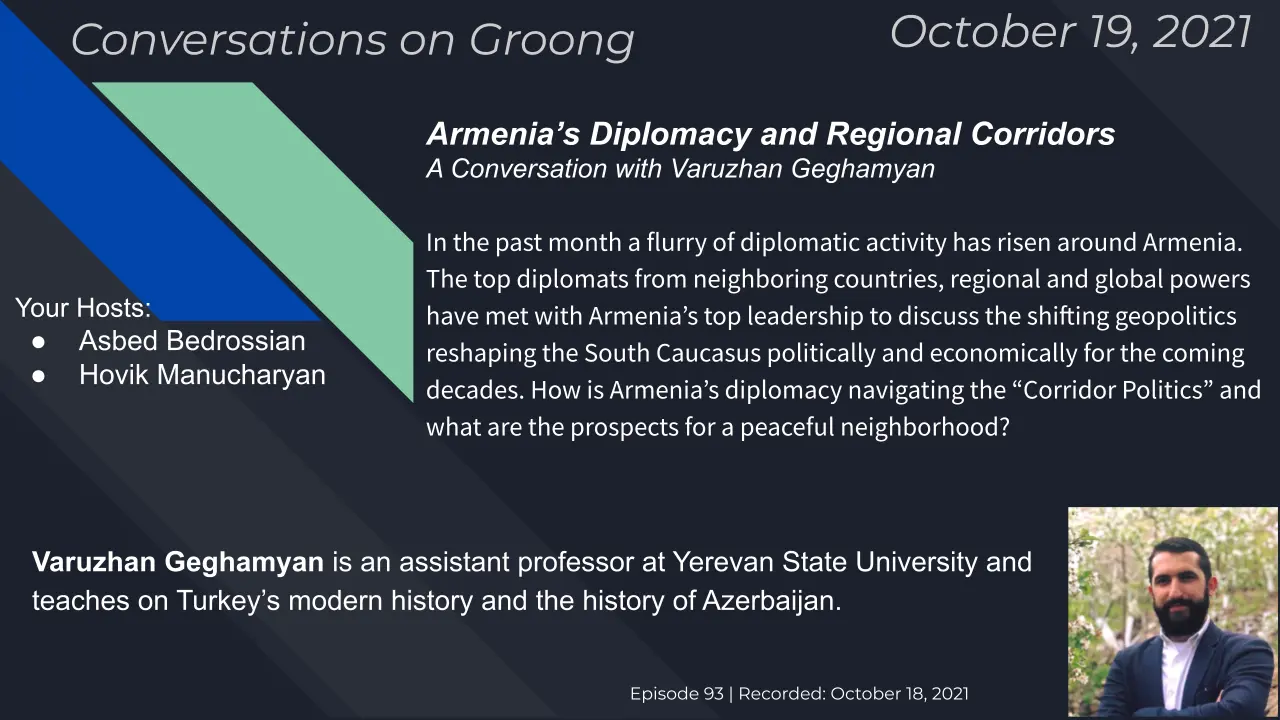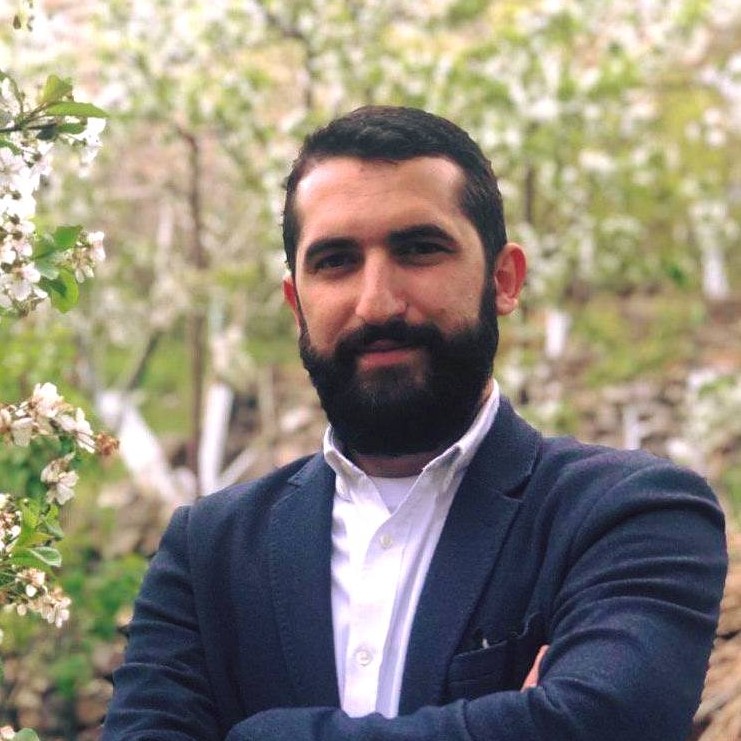Armenia’s Diplomacy and Corridors Politics | Ep. 93 - Oct 19, 2021 [EP93]
Posted on Tuesday, Oct 19, 2021 | Category: Armenia, Artsakh, Azerbaijan | Series: COG
Armenia’s Diplomacy and Corridor Politics
Topics:
- In the past month a flurry of diplomatic activity has risen around Armenia. The top diplomats from neighboring countries, regional and global powers have met with Armenia’s top leadership to discuss the shifting geopolitics reshaping the South Caucasus politically and economically for the coming decades. How is Armenia’s diplomacy navigating the “Corridor Politics” and what are the prospects for a peaceful neighborhood?
Guest:
Episode 93 | Recorded: October 18, 2021
Show Notes
Foreign Minister of India Visits Armenia
On Wednesday, October 12, India’s External Affairs Minister Subramanyam Jaishankar visited Armenia, where he met with PM Pashinyan, FM Mirzoyan and Parliament president Alen Simonyan. This was a first-ever high-level visit by an Indian minister to Armenia. Beyond Jaishankar’s visits to Tsitsernakaberd, and Cultural gestures and expressions, the diplomats discussed significant geopolitical projects involving Armenia in the International North-South Transport Corridor (INSTC) project from India, through Iran, Armenia, Georgia, and beyond.
The two countries have traditionally friendly ties. There are over 3,000 Indian students in Armenian universities, and Armenia supports India’s candidacy for permanent membership in the UNSC.
The timing of this visit and the fact that it is the first such visit in the history of independent Armenia, seems very conspicuous, coming right after the recent Iran-Azerbaijan tensions and in the midst of talk of “corridors” through Armenia. Was this meeting in response to regional geopolitical developments?
Questions:
- India’s geopolitical interests in Armenia are interesting and complex. Was this visit a success in cementing closer political and economic relations between the two countries?
- What is Iran’s role and stake in this relationship? How is it promoting it?
- Much is being said about Iran’s Chabahar port, on its coast on the Indian Ocean. What is the significance of this port in the North-South route?
- How do Azerbaijan and Turkey look upon this relationship?
- How does Russia feel about stronger Armenian relations with Iran and India specifically?
- Looking at the chronology of events, the Pashinyan-Putin meeting was announced a day after the Indian announcement. Was the Armenian government’s PR commensurate with the level of importance shown by Jaishankar?
- Does China view the INSTC - North-South Corridor, in light of its own Belt & Road Initiative? Do these international projects compete, or do they complement each other?
- Is Armenia more likely to benefit from these projects, or end up in the middle of yet another superpower proxy competition?
Corridors
We were talking with Pietro Shakarian and Benyamin Poghosyan a couple of weeks ago, and we touched upon the so-called “Zangezur Corridor” that Aliyev talks about all the time. The consensus was that, at least for the time being, Aliyev’s definition of a “corridor” is unfettered access through Armenian territory between Azerbaijan and Nakhichevan. This means visa-free, customs-free, inspection-free access for people and goods through Syunik, Gegharkunik, etc.
In exchange Armenia would get similar access to Russia and Iran through Azerbaijani territories. This of course is part of implementing Point 9 of the November Agreement.
Question:
- What are your thoughts about connecting Azerbaijan with Nakhichevan and on to Turkey?
Prospects for Peace
Azerbaijan’s definition for peace begins with a process to determine and recognize its borders with Armenia, including an explicit recognition of Artsakh as Azerbaijani territory.
Questions:
- What are Armenia’s prospects for peace with Azerbaijan? We’ll ask later about the prospects for war.
Pashinyan’s Government
The 44-day War in Artsakh left Armenia in a very weak negotiating position vis-à-vis Azerbaijan and as a result the November agreement committed Armenia to a number of very painful concessions and depending on how Armenia’s government conducts its negotiations and implements the requirements in the Agreement, there’s risk to the long term sovereignty of Armenia, especially given that Aliyev has proven to be negotiating not in good faith.
For example, Pashinyan’s immediate release of all Azeri prisoners before Aliyev reneged on his obligation, caused a year-long and continuing pain to thousands of families who lost their loved ones in the war. Meanwhile, Aliyev has forced Pashinyan into further concessions for the return of more POWs, which were not in the November Agreement. This, of course, has created a deep lack of trust towards the current Armenian government regardless of the June elections, and Pashinyan’s claims that the domestic situation has been resolved.
Questions:
- Does this government have the resources to negotiate for Armenia’s best interests? Economic, human, talent, diplomatic, military, and other resources.
Wrap-up
All right, that’s our show, we hope you found it useful. Please find us on Social Media and follow us everywhere you get your Armenian news, the links are in the show notes. Thanks to Laura Osborn for the music on our podcasts. We’ll talk to you soon!
Guests

Varuzhan Geghamyan
Prof. Varuzhan Geghamyan is assistant professor at Yerevan State University’s Department of Oriental Studies, teaching courses on Turkey’s modern history, History of Azerbaijan; Sociocultural anthropology of Azerbaijan; Political ideologies and parties in Modern Turkey & History of the Turkish Republic.
Hosts

Hovik Manucharyan
Hovik Manucharyan is an information security engineer who moved from Seattle to Armenia in 2022. He co-founded the ANN/Groong podcast in 2020 and has been a contributor to Groong News since the late 1990s.
Disclaimer: The views expressed by Hovik Manucharyan on the ANN/Groong podcast are his own and do not necessarily reflect the opinions of his employer or any other organization.

Asbed Bedrossian
Asbed is founder of the Armenian News Network Groong and co-founder of the ANN/Groong podcast.